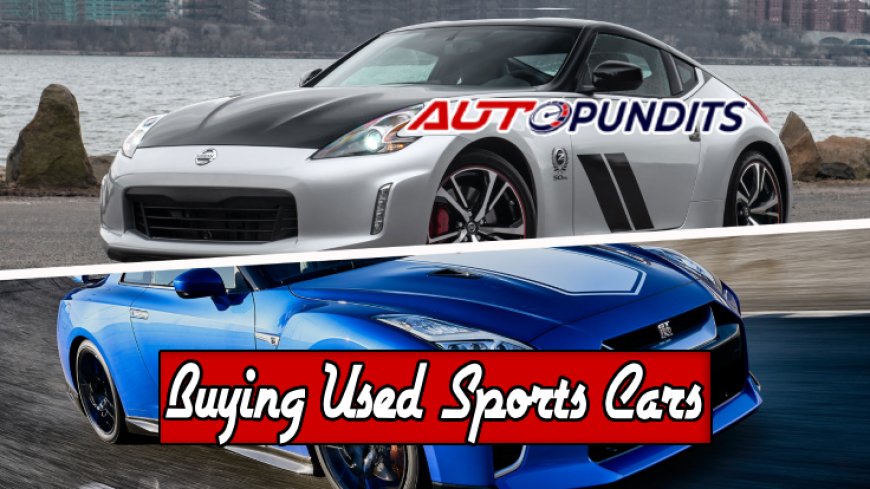Top 10 Tips for Buying Used Sports Cars
Discover essential advice for securing a top-notch used sports car without the buyer's remorse.

There's nothing quite like driving a sports car — and purchasing a used one can be a smart move if done correctly. This used sports cars buying guide aims to provide you with the knowledge to make informed decisions and avoid common pitfalls.
Understanding the Essentials of Used Sports Cars Buying
In the high-speed world of sports cars, where cutting-edge technology meets iconic design, buying a used car requires some additional considerations. Along with the usual factors like price and condition, you have to grapple with issues unique to sports cars, like maintenance, performance and specifics of luxury brands. To help you navigate your path to the perfect used sports car, we have compiled our top ten tips.
Table of Contents
- Know Your Choices
- Set Your Budget
- Research Makes, Models, and Prices
- Understand Performance Specs
- Check for a Careful Inspection
- Examine the Service History
- Take a Test Drive
- Consider the Insurance Costs
- Negotiate the Price
- Get a Professional Opinion
Know Your Choices

Before embarking on your journey to own a used sports car, take some time to familiarize yourself with the various types and brands available. From Italian exotics like Ferrari and Lamborghini to German marvels by Porsche and Mercedes-Benz, the choices are vast. Consider what type of sports car aligns with your personal tastes and lifestyle. Each brand comes with its unique blend of aesthetics, performance, and heritage — all significant facets when choosing a sports car.
A Quick Overview of Renowned Sports Car Brands:
- Ferrari: Known for their spotless racing pedigree, these Italian machines offer unbeatable performance and styling.
- Lamborghini: Defined by dramatic designs and thunderous soundtracks, Lamborghinis are about delivering exhilarating high-performance experiences.
- Porsche: A perfect blend of sportiness and usability, Porsches bring a unique combination of performance and everyday drivability.
- Mercedes-Benz AMG: German engineering meets sports car performance, offering practical sports cars that can be used daily.
Set Your Budget
Once you have a good idea of the type of sports car you desire, it's crucial to set a reasonable budget. It's easy to get lured by the glamour of sports cars and overspend. Keep in mind that the purchase price is just the beginning — you'll also need to consider the cost of insurance, maintenance, and potential repairs.
Bold Reminder: Don't forget to account for the expenses of premium fuel, high-performance tires, and more frequent oil changes that come with owning a sports car.
Research Makes, Models, and Prices
As with any significant purchase, research is your best friend when buying a used sports car. Several resources online dedicated to automotive data, such as Edmunds, Kelley Blue Book, or AutoTrader, can give you a general sense of what to expect in terms of pricing and reliability. Be sure to research various makes and models, comparing prices and key features.
Additionally, be wary of deals that seem too good to be true. They often are. It's more important to find a well-maintained, reliable sports car than one listed at a suspiciously low price.
Understand Performance Specs
Sports cars differentiate themselves from ordinary vehicles through their amped-up performance. Understanding what particular specifications mean will help you make a more informed decision. Acceleration (0-60 mph times), top speed, horsepower, torque, and handling characteristics all play a significant role how the car performs.
Sometimes, you may need to strike a balance. For instance, more horsepower might mean a faster car, but it could also mean less fuel efficiency. It's about finding what combination works best for you,"
advises senior auto analyst at AutoPundits, Greg Rhys.
Tech Alert: Look out for performance-enhancing technologies like turbocharging, supercharging, and all-wheel drive which could add to the car's overall appeal.
Check for a Careful Inspection
Before you commit to a particular sports car, have it thoroughly checked by a qualified mechanic or technician who specializes in such vehicles. A comprehensive inspection can extend beyond the cosmetic appearance to include evaluating the engine condition, undercarriage, tires, and brakes.
Inspection Guideline: It's crucial to get a detailed look at potential hidden problems. Be prepared to invest in a comprehensive pre-purchase inspection — this will save you trouble and expense down the line.
Examine the Service History
As you narrow down your options, get a hold of the service history of the vehicles you're considering. A well-documented service history provides insight into how well the car was cared for by its previous owners. Additionally, it illuminates recurring problems or significant repairs that have been undertaken.
Red flags to watch for: Incomplete records, regular repair work on the same issue, and patterns suggesting neglect.
Take a Test Drive

A test drive is more than just a joy ride; it’s an opportunity to assess the car's performance, handling, and to detect any unusual noises or quirks. Use this chance to see whether the sports car lives up to your expectations and feels comfortable to you. It’s also an excellent time to test the car's features: brakes, air conditioning, radio, and more.
Test-Drive Checklist:
- Power and acceleration must match the given specifications.
- Brakes should be responsive and free of squeaking or rattling noises.
- The steering should be smooth, with no play or delayed response.
- The gear shifts, whether manual or automatic, should be seamless and quiet.
Consider the Insurance Costs

While sport cars deliver unrivaled driving exhilaration, their insurance costs can be higher compared to standard vehicles. It's essential to factor these costs into your budget. Get quotes from several insurance companies to ensure you’re getting the best deal.
Owing a Sports Car: Typically, insurance costs for sports cars are higher due to their top speeds, cost to repair, and greater likelihood of being stolen.
Negotiate the Price
Remember: the listed price isn’t always the final price. Don’t be afraid to negotiate. If you’ve done your homework and are aware of the sports car's market value, you’re in a great position to negotiate. Keep in mind that dealership pricing can often be flexible.
Negotiation Tip: Don’t rush directly into price talks. Start with discussing the car's condition based on your inspection and work your way towards a mutually agreeable price.
Get a Professional Opinion
Getting a professional's opinion is a wise move before making your final decision. Consulting a trusted mechanic or an independent sports car specialist will arm you with additional knowledge and confidence.
Expert Advice: If you’re are an AutoPundits reader, you already have a wealth of auto experts at your disposal. Don’t hesitate to use that resource.
Shopping for a used sports car can be a thrilling journey filled with excitement and potential challenges. With these top tips, we hope you feel equipped to make an informed decision and find the sports car that's the perfect match for your needs and desires.
What's Your Reaction?


































































